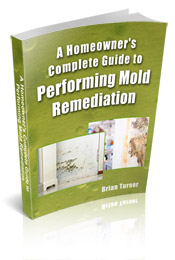Find a pre-screened local mold removal specialist Free Estimate
Find a Mold Specialist Now
Click or Call, Toll-Free 24/7
Review of
A Homeowner's Complete
Guide to Performing
Mold Remediation
A Homeowner’s Complete Guide to Performing Mold Remediation is unique among ebooks because it’s well-written, easy to understand, and full of useful, practical information. It’s also written by a leading expert in the subject matter. Brian Turner has a master’s degree in chemistry and is a certified microbial, lead, and asbestos inspector. He contributed to the New York City Department of Health Guidelines on Assessment and Remediation of Mold in Indoor Environments, wrote and co-produced a training video to help residents dealing with mold problems after Hurricane Katrina, and performed hundreds of mold inspections as a senior inspector for a leading environmental consulting firm. This book is the industry standard in mold removal and remediation, written for the average homeowner.
Everything You Wanted to Know about Mold and Then Some
A Homeowner’s Complete Guide to Performing Mold Remediation contains all you ever wanted to know about mold and then some. The book explains how mold grows and spreads, so you can understand why you have a mold problem in your home and how it can affect you. It explains why it’s harmful to your health and lists common illnesses caused by different types of mold. Some people may not be interested in all the scientific information about how mold grows and reproduces, and if that’s the case, you can skip that section of the book. For people that want to really understand what they’re dealing with, though, the information is explained in an easy-to-understand way.
Finding Mold
The guide tells you what surfaces mold can and cannot grow on, which helps you know where to look. Detailed instructions are provided about how to inspect for hidden mold, such as mold growing inside walls. The book also includes photos of different types of mold growing on different surfaces, so you can get an idea of what to look for.
Mold Testing Explained
The book explains how professional mold tests are conducted and how to conduct a home mold test yourself. It explains what the results of the tests mean, so you can really understand what you’re dealing with.
Safety Tips
Safety is extremely important if you’re doing mold remediation on your own and this book explains all the safety procedures you need to follow. Photographs are included to show you exactly how to seal off the area in which you’re working in order to prevent the spread of mold to other areas of the home. The book also explains the different types of respirators available, so you can choose the right one for the particular mold situation you are dealing with. It even includes pictures of the different types of respirators so you’ll know exactly what to look for.
Step-by-Step Instructions
This may be the most important part of the whole book. Step-by-step instructions are provided, telling you exactly what to do from preparing your work area, to removing mold, to safely disposing of mold-contaminated materials (like carpeting or sheetrock). The guide includes detailed instructions for handling a wide variety of moldy materials, including sheetrock, wood, vinyl floor tiles, acoustic ceiling tiles, and carpets. Instructions are provided for performing complete mold remediation in each room of the house, including attics and crawl spaces. Diagrams and actual photos illustrate the procedures described. Even if you’re not particularly handy or don’t know much about home improvement, you should be able to understand and follow the instructions in this book.
Mold in Heating, Ventilation, and Air Conditioning Systems
Unless you know something about mold remediation and/or heating, ventilation, and air conditioning, you may want to hire a professional to deal with mold in your ductwork. If you do plan to tackle the task yourself, though, this guide is a valuable resource. It includes detailed instructions, accompanied by photos showing each area of an HVAC system where mold might reside.
Mold Prevention
The final section of this guide explains all about mold prevention, including what to do after completing mold remediation in order to keep mold from growing back. This information would be valuable for any homeowner; even if you don’t have mold problem, you want to know how to make sure you don’t develop one, right?
To learn more about this ebook or to see if it might be helpful for you, follow this link to Amazon for The Homeowner's Complete Guide to Performing Mold Remediation.
Free Home Inspection By A Mold Removal Specialist
Search This Website

Recent Articles
-
See Our 5 Recommended Mold Removal Companies in Covington, KY
Apr 16, 25 12:59 PM
-
See Our 5 Recommended Mold Removal Companies in Wheaton, IL
Jun 20, 24 10:33 AM
-
See Our 5 Recommended Mold Removal Companies in Aberdeen, SD
Oct 08, 21 04:05 PM
